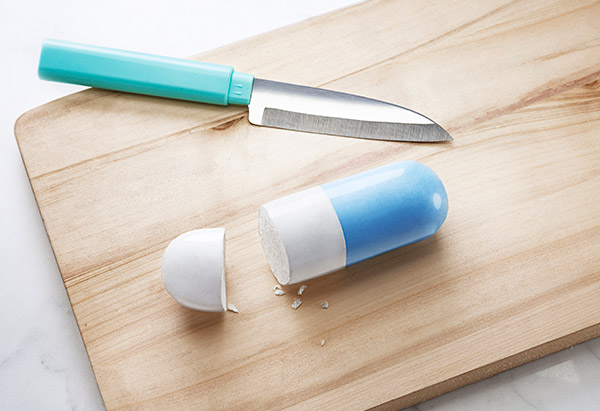Is a Low-Dose Antidepressant Right for You?
How to know if your prescription is stronger than it needs to be.

Photo: Mauricio Alejo
For the first seven years I was on an antidepressant, I put up with some pretty lousy side effects. I gained ten pounds I couldn't get rid of, my blood pressure spiked, and my libido went haywire. But considering the alternative—returning to bone-deep fatigue, intense crying jags, and pervasive negative thinking—I didn't feel like I had much choice.
By 2011, though, my life was chugging along at a comfortable pace, and I told my doctor I wanted to try going off the drug. As she decreased my dose, something surprising happened. On less than half of my original prescription, my mood stayed level but my sex life got better, I shed a few pounds, and my blood pressure returned to normal. At first I chalked up my experience to the placebo effect, but after I went off the medication entirely, I couldn't shake my hunch that I'd never needed such a high dose to begin with.
To understand what was going on, I reached out to Houston-based psychiatrist Lucy Puryear, MD, who has put patients on small doses of Prozac and Zoloft (think five or 12.5 milligrams, respectively, compared with the more typical 20 or 50) to help them get the mood-regulating benefits without the drawbacks. Given that nearly 23 percent of American women between the ages of 40 and 59 take antidepressants, and that many suffer the same side effects I did, could lower doses be a real solution for more women? "Everyone's ideal dose varies," Puryear says. "It depends on how your liver metabolizes a drug, and that's based on genetics. If you're a slow metabolizer, you may need less to get the same results as a fast metabolizer."
Many doctors, however, prescribe drugs based on the standard starting dose, an amount that's been shown to benefit the widest swath of patients—male and female—in clinical trials. That's hardly a customized approach for anyone, and could be especially inaccurate for women. "Since premenopausal women have more estrogen than men, they may be more sensitive to antidepressants because estrogen influences the neurotransmitters those drugs target," explains gynecologist Sara Gottfried, MD, author of the forthcoming The Hormone Cure.
But before you start chopping up your pills, know this: "Low-dose prescriptions are not the treatment of choice for major depression," says T. Byram Karasu, MD, psychiatry professor at Albert Einstein College of Medicine. Low dosing, he says, may work well for people with mild depression that can occur in response to a loss or transition.
Recently, I went back on an antidepressant after finalizing my divorce and quitting my job to write a book sent me into a downward spiral of insomnia and dark thoughts. I told my doctor I wanted to take a third of the dosage I'd been on before. She let me give it a shot. Six months later, it's still working—I'm emotionally well and side effect–free. Sometimes a little really can go a long way.
Next: 3 ways to lower your dose
By 2011, though, my life was chugging along at a comfortable pace, and I told my doctor I wanted to try going off the drug. As she decreased my dose, something surprising happened. On less than half of my original prescription, my mood stayed level but my sex life got better, I shed a few pounds, and my blood pressure returned to normal. At first I chalked up my experience to the placebo effect, but after I went off the medication entirely, I couldn't shake my hunch that I'd never needed such a high dose to begin with.
To understand what was going on, I reached out to Houston-based psychiatrist Lucy Puryear, MD, who has put patients on small doses of Prozac and Zoloft (think five or 12.5 milligrams, respectively, compared with the more typical 20 or 50) to help them get the mood-regulating benefits without the drawbacks. Given that nearly 23 percent of American women between the ages of 40 and 59 take antidepressants, and that many suffer the same side effects I did, could lower doses be a real solution for more women? "Everyone's ideal dose varies," Puryear says. "It depends on how your liver metabolizes a drug, and that's based on genetics. If you're a slow metabolizer, you may need less to get the same results as a fast metabolizer."
Many doctors, however, prescribe drugs based on the standard starting dose, an amount that's been shown to benefit the widest swath of patients—male and female—in clinical trials. That's hardly a customized approach for anyone, and could be especially inaccurate for women. "Since premenopausal women have more estrogen than men, they may be more sensitive to antidepressants because estrogen influences the neurotransmitters those drugs target," explains gynecologist Sara Gottfried, MD, author of the forthcoming The Hormone Cure.
But before you start chopping up your pills, know this: "Low-dose prescriptions are not the treatment of choice for major depression," says T. Byram Karasu, MD, psychiatry professor at Albert Einstein College of Medicine. Low dosing, he says, may work well for people with mild depression that can occur in response to a loss or transition.
Recently, I went back on an antidepressant after finalizing my divorce and quitting my job to write a book sent me into a downward spiral of insomnia and dark thoughts. I told my doctor I wanted to take a third of the dosage I'd been on before. She let me give it a shot. Six months later, it's still working—I'm emotionally well and side effect–free. Sometimes a little really can go a long way.
Next: 3 ways to lower your dose
As a reminder, always consult your doctor for medical advice and treatment before starting any program.



